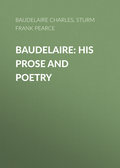
Baudelaire Charles
Charles Baudelaire, His Life
APPENDIX
Letter from M. Sainte-Beuve
1857.
MY DEAR FRIEND,
I have received your beautiful volume, and first I have to thank you for the kind words with which it was accompanied; for a long time you have accustomed me to your good and loyal sentiments towards me. I knew some of your verses from having read them in other selections; collected together, they have quite a different effect. To say to you that this general effect is sad would not astonish you; it is what you wanted. To tell you that you have not hesitated in gathering your flowers together for any sort of image and colour, terrible and distressing though it might be, you know it better than I do; again, it is what you have wished. You are a true poet of the school of "art," and if we could talk to each other on the subject of this book, there would be much to say. You, also, are of those who look for poetry everywhere; and because, before you, others have sought it in all the easily accessible places, because you have been left little room, because the earthly and the celestial fields were rather too heavily harvested, and that for thirty years and more lyrics of all kinds have been written, because you have come so late and the last, you have said to yourself, I imagine: "Ah well, I shall still find poetry, and I shall find it where no one else has thought of gathering and extracting it," and you have taken Hell, you have made yourself devil. You wanted to wrest their secrets from the demons of the night. In doing this with subtilty, with refinement, with a careful talent, and an almost meticulous surrender of expression, in stringing the detail, in playing upon what is horrible, you seem to have been amusing yourself. You have suffered, however, you have tormented yourself to display your wearinesses, your nightmares, your moral tortures; you must have suffered much, my dear fellow. This particular sadness that shows itself in your pages, and in which I recognise the last symptom of a sick generation of whom the seniors are well known to us, is also that which you will have experienced.
You say somewhere, in marking the spiritual awakening which comes after ill-spent nights, that, when "the white and rosy dawn," appearing suddenly, comes in company with "the tormenting Ideal," at that moment, by a sort of avenging expiation —
"Dans la brute assoupie un ange se réveille!"
It is this angel that I invoke in you and that must be cultivated. If only you had let it intervene a little oftener in two or three separate places, that would have been sufficient to have disentangled your thought, so that all these dreams of evil, all these obscure forms, and all these outlandish interweavings wherein your imagination has wearied itself would have appeared in their true guise – that is to say half scattered, ready and waiting to flee before the light. Your book, then, would have yielded, like a "Temptation of St. Antony," at the moment when dawn draws near and one feels that it is about to break.
It is thus that I picture and that I understand it. One must quote oneself as an example as little as possible. But we also, thirty years ago, have sought poetry where we could. Many fields were already reaped, and the most beautiful laurels cut. I remember in what melancholy state of mind and soul I wrote "Joseph Delorme," and I am still astonished when I happen (which is rarely) to reopen this little volume, at what I have dared to say, to express in it. But, in obedience to the impulse and natural progress of my sentiments, I wrote a selection the following year, still very imperfect, but animated by a gentler, purer inspiration, "Les Consolations," and, thanks to this simple development towards good, I have been almost pardoned. Let me give you some advice which would surprise those who do not know you. You mistrust passion too much; with you it is a theory. You accord too much to the mind, to combination. Let yourself alone, do not be afraid to feel too much like others. Never fear to be common; you will always have enough in your delicacy of expression to make you distinguished.
I do not wish any longer to appear more prudish in your eyes than I am. I like more than one part of your volume – those "Tristesses de la Lune," for example, a delightful sonnet that seems like some English poet contemporary with Shakespeare's youth. It is not up to these stanzas, "A celle qui est trop gaie," which seem to me exquisitely done. Why is this piece not in Latin, or rather in Greek, and included in the section of the "Erotica" of the "Anthology"? The savant, Brunck, would have gathered it into the "Analecta veterum poetarum"; President Bouhier and La Monnoye – that is to say, men of authority and sober habits —castissimæ vitæ morumque integerrimorum, would have expounded it without shame and we should put on it the sign of the lovers. Tange Chlœn semel arrogantem…
But, once again, it is not a question of that nor of compliments. I would rather grumble, and, if I were walking with you by the side of the sea, along a cliff, without pretending to play the mentor, I should try to trip you up, my dear friend, and throw you roughly into the water, so that you, who can swim, would go straightway under the sun in full course.
Yours always,SAINTE-BEUVE.





